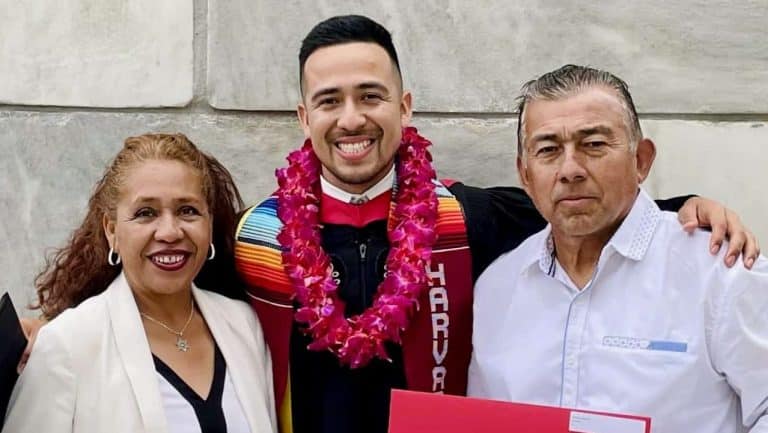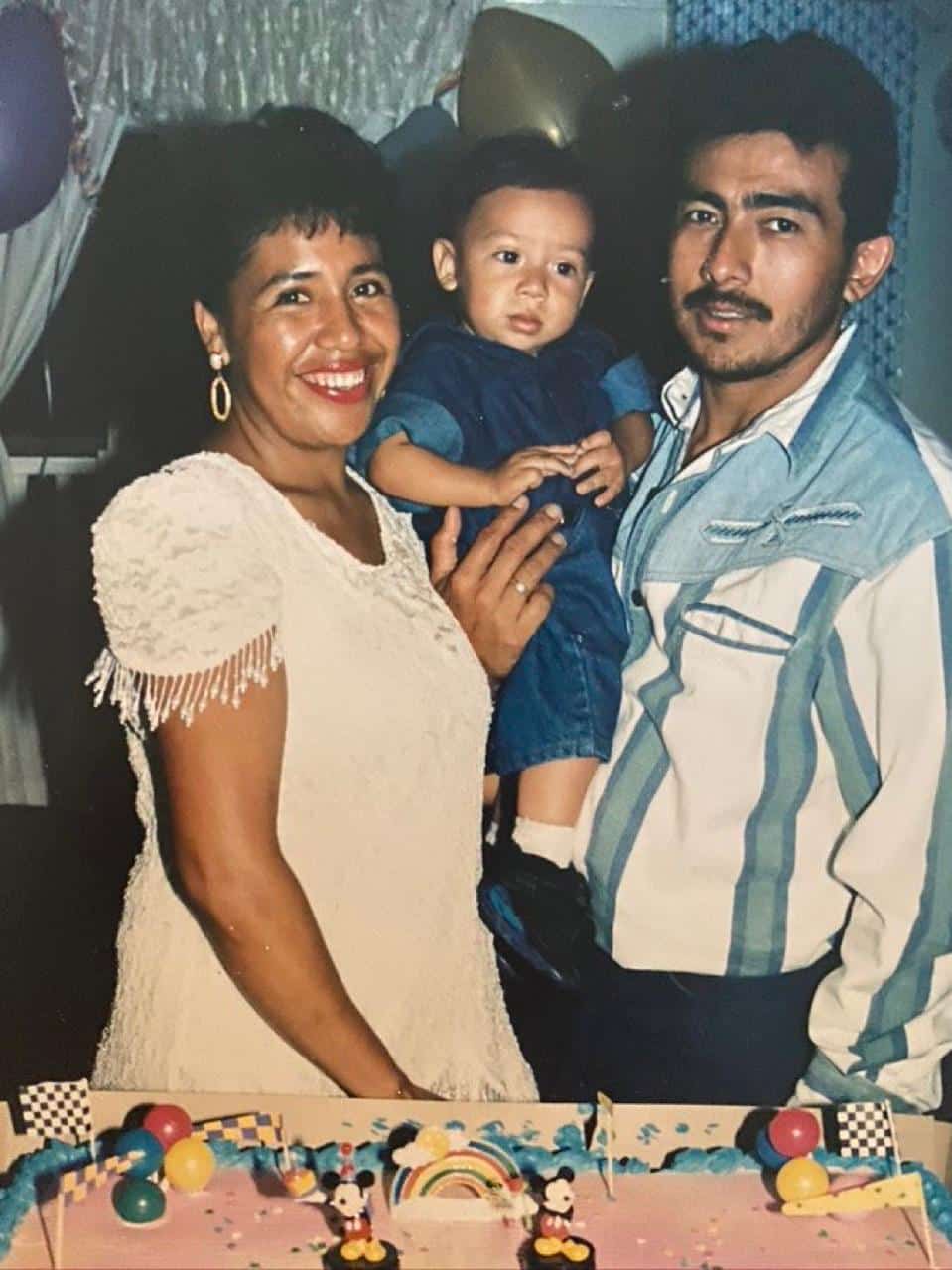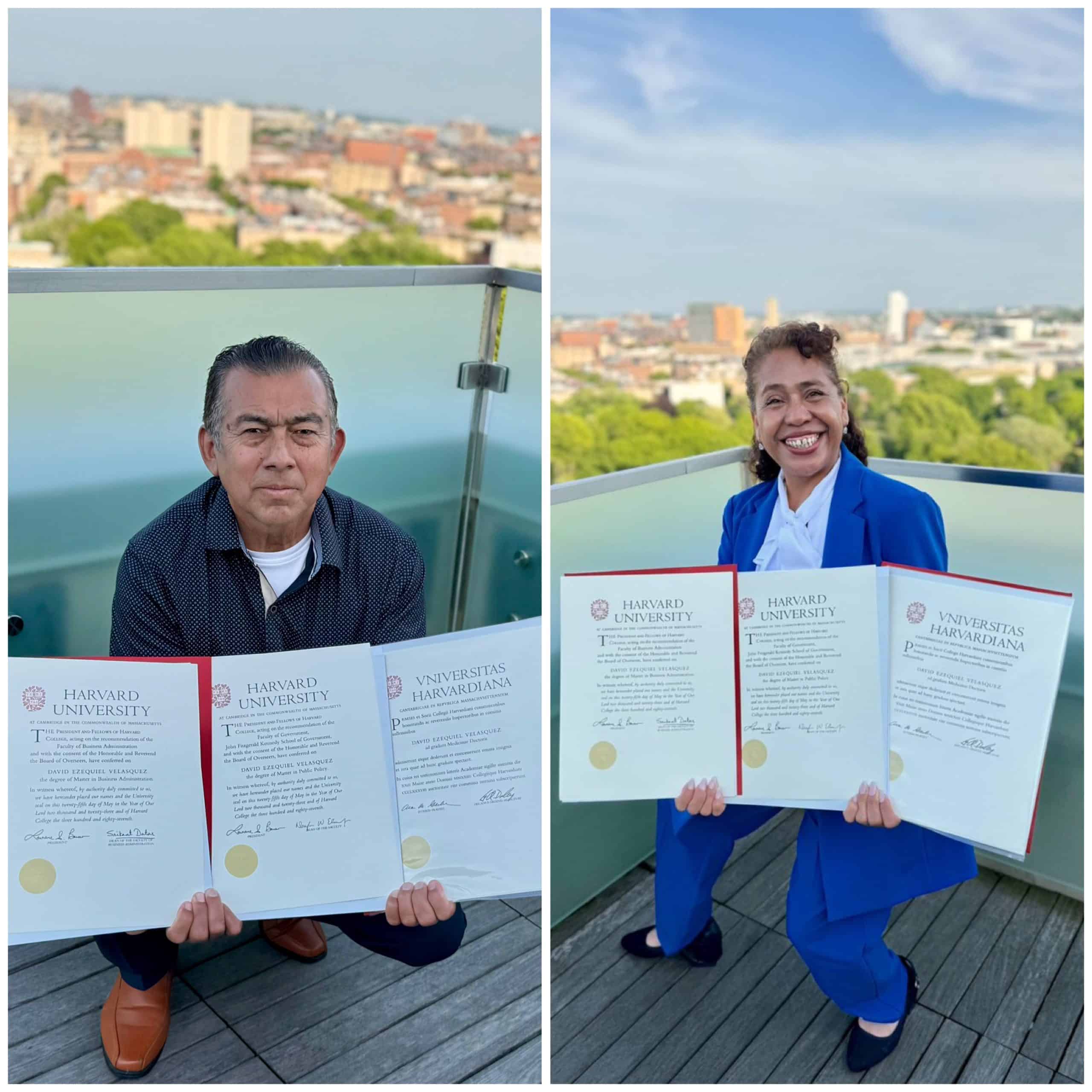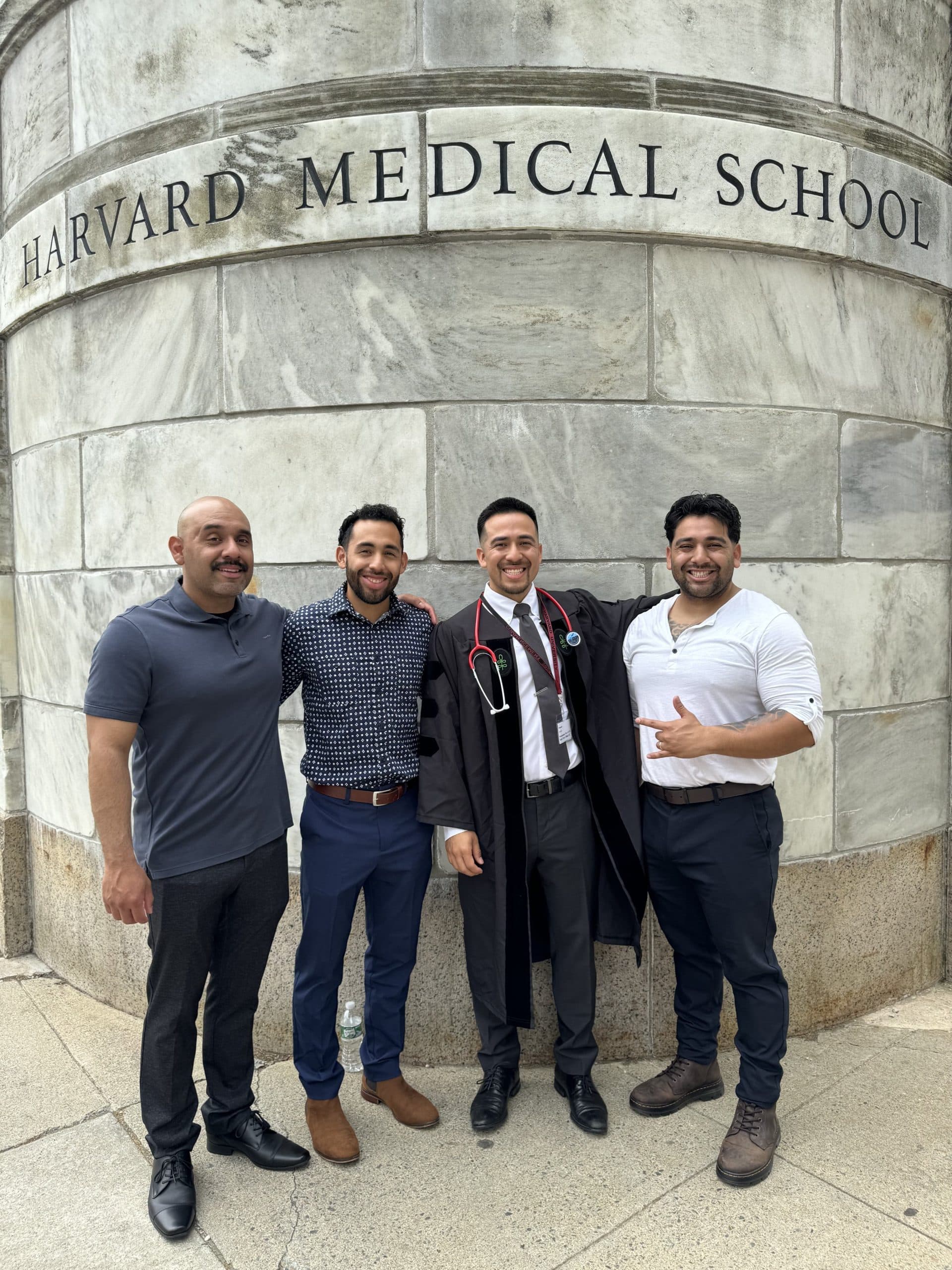4 de junio 2024

Children of Exile: The Births “Sowing Hope” in the Camp of Nicaraguan Farmers

PUBLICIDAD 1M
PUBLICIDAD 4D
PUBLICIDAD 5D
The son of Nicaraguan parents is the first in the history of the university to obtain degrees from the Schools of Business, Medical and Public Policy

When David started college he was scared and almost dropped out. He thought he wouldn't graduate. No one in his family had gone to college. He was a kid from a migrant family who had gotten into the University of Southern California on a scholarship and a loan, and he felt out of place in a new environment after living with his parents for 18 years. "What am I doing here, who am I, to be able to be at this university?", he wondered. But, after talking with his family and friends, he changed his plans. He decided he would apply himself like never before, reading every book in his major twice. He saw the results: excellent grades that kept motivating him until he graduated.
That young man, a Nicaraguan-American born of Nicaraguan parents in California, is now the 28-year-old who just graduated from three Harvard University schools at once, an unprecedented event in the history of one of the most prestigious universities in the world. David Velásquez recently attended the graduation ceremony in which he received his three degrees: one as a medical doctor from Harvard Medical School, and two master's degrees from Harvard's Business School and the Harvard's Kennedy School of Public Policy, respectively. He is the first to earn this combination of degrees in the history of one of the world's top universities, according to Harvard Communications Department records.
David's mother, Sara Velásquez, remembers being concerned when, many years ago, she was called to an appointment at her son's preschool. She was surprised when the teacher told her: "You have a genius in your family." That genius made it to Harvard, she says now, proudly.
David's story begins with his parents who left Nicaragua in the 1980s, during the turbulent years of the civil war and after the overthrow of the Somoza dictatorship. David's father, Calixto Velásquez, participated in the struggle against the Somoza regime and, a few years later, joined the Nicaraguan Resistance, known as the Contra, in opposition to the Sandinista government, says The Harvard Gazette, which featured the young man's story on its site.
After the war, with the electoral triumph of Violeta Barrios de Chamorro in 1990 and the democratic transition, Calixto left Nicaragua for security reasons, fearing reprisals from his former Sandinista adversaries. He traveled to Mexico, where he met Sara, also a Nicaraguan, who had emigrated years earlier. They both came from hard-working families. Neither had finished their primary school education, as they both had to work from a very young age.
In Mexico, Sara and Calixto fell in love and started a family. There they had their first two children in Mexico. Their goal was to reach the United States to seek asylum and gain better living conditions. That is how they arrived in California in 1993. "First they went to a church, because they had nowhere to go; they had no family or friends in the state of California," says David.
Even without papers, Calixto had to go out to look for work "doing whatever he could" in order to provide housing and food for his family, which soon added two new members, including David.

"We had ups and downs. But we didn't give up," says Sara. Sharing an anecdote that she says reflects David's personality from a very young age, Sara recounts that she was at home preparing hot dogs when she realized she was out of them. David noticed it, too. He went to class, and when he returned, he had brought his mom some chicken nuggets that had been served in the school cafeteria so they could be part of the family lunch menu. He brought them home in one of his socks. "Of course, I was shocked that he was so aware of the need," says Sara.
David confirms that his family's serious economic difficulties had an impact on his character and outlook on life. In 2009, when he was thirteen, his family became homeless. "When the recession was impacting many people here in the United States, we lost our home in the city of Rosamond, California. We had nowhere to go. My parents did what they could, and we went to a motel and slept there," he recalls. After playing basketball, his friends would offer him a ride home, he recalls. "I always told them no, because I didn't want them to see where we were living. On my walk back to the motel I would say to myself, 'Wow, this is not normal. Why is this happening? What can I do?'"
The best David could do at the time was to make his parents proud through his grades. "I wanted to be a good son so my mom and dad wouldn't worry about me and my brothers. So when I was a kid, whenever I earned a certificate or an award, I would give it to my mom or dad. And then I would watch them be happy in the midst of worrying about paying the rent and the bills for the month."
The young doctor also says that his childhood passion for sports also had a lot to do with who he is today: "I learned how to team up, how to lose, how to win, how to work hard for the next success."
When it was time to go to college, David obtained a scholarship and applied for loans to attend the University of Southern California. Despite his doubts, he gave it his best effort and graduated with honors with a Bachelor of Science in Human Biology, with a minor in Health Care Studies.
After David got his college degree, he had the goal of becoming a doctor. "When I was a kid I didn't think I was going to be a doctor. I didn't know doctors, we didn't go to the doctor much because we didn't have health insurance for many years," he says. One day his mother got sick. She had a fever, a cough and severe fatigue, but she couldn't go to the doctor because they didn't even have money for gas for the car. David thought: "I don't want anyone, not my mother or anyone else in the community, to have that problem, of not being able to go to the doctor because they don't have money, because they don't speak the language….".
So David set himself the goal of going to Harvard University. "My mom and dad didn't have much money. They've had plenty of jobs cleaning, in construction, and a lot of other jobs where they make minimum wage," he says. Once David got into Harvard in 2017 thanks to a scholarship and a loan, Sara and Calixto helped him as much as they could. David also worked for a few years as a tutor for other students in return for the university paying for some of his room and board costs.
But David felt that a medical degree was not enough. He felt he needed other tools and kinds of knowledge to achieve his goal of changing the reality for medically underserved populations in the United States, where there is no universal access to health care. "I had no idea I was going to do this [earn three degrees at once]. I did it because I thought that in order to positively impact our population to the best of my ability, I had to learn the basics of business, public policy and medicine," he shares.
David says another family episode convinced him even more of the need to prepare himself in these other areas. His father had a heart attack in 2019, when David was already a medical student. With a hospital bill of $120,000, he thought his family would go bankrupt again, but he found out about non-profit hospital policies and how his father, having limited financial income, could apply for a subsidy to not have to pay the full amount.
Now an internist, David dreams of serving the Spanish-speaking community as a doctor. "Here in the United States, only 6% of doctors are Latinos or Latinas. It's about the same for other racial groups as well. I would like to be one of the doctors who improves that number."
But Dr. Velasquez also wants to find ways for more people in the United States to be able to have health insurance. "I think each state can do a lot to cover the population that doesn't have health insurance, using Medicaid in many cases, and in other cases, they can work with the federal government to provide funding for that," David explains.
Sara and Calixto feel proud of having raised their four children to be responsible, hardworking, honest and dedicated. "Whatever they focus on, they start and they finish," says Sara. "We instill in them humility and a respect for people," Calixto adds.
The children were also raised with a strong Nicaraguan identity. At home, they had gallo pinto (Nicaraguan rice and beans mix) for breakfast every day, says Sara. Calixto says he has always told his children where they come from. David says that he has been very interested in learning about the history of the country he feels is his own, and he is aware of the news and the problems that afflict Nicaragua. He also has fond memories of visiting Nicaragua as a child and playing with other kids similar to him. "It is a wonderful country, with many good people that I know here in the United States, but it is also a country that has had and still has problems, which we must improve," he reflects.
David's graduation day was unforgettable for his entire family. "I wanted to shout to the four winds about how happy I was at that moment," says Calixto, who admits that he had to calm himself down a bit because of his heart condition. "One has to do one's best for one's children, whether you're rich or poor," he advises. Sara says she still hasn't woken up from the dream. "I have wonderful children and I have no way to thank our Lord. I tell David that he is like an eagle, he just shakes it off and flies, and there is my eagle. He flew where God put him, to be a doctor," she says, her eyes full of emotion.


Dr. Velásquez posted a thread on the social media site X that became one of the viral news stories of the week in the United States and beyond. With nine million views, many English and Spanish media outlets have since interviewed him.
This is my mom.
— David Velasquez (@davidevelasqu) May 24, 2024
She was an asylum seeker.
She slept in a church b/c she had nowhere else to go.
She is a housekeeper & a waitress.
She is my hero.
These degrees are for her.
Harvard Medical School, M.D. ✅
Harvard Business School, M.B.A. ✅
Harvard Kennedy School of Government,… pic.twitter.com/BbFPdQwdKl
"I think people really liked reading that I always think about my family. Also, people say in America that they have 'the American dream,' but many don't have a home, they don't have food, and without all that, it's very hard to achieve 'the American dream.' When they see that someone achieved something like what I did, people smile and say, 'OK, if he did it, I can achieve my goals, too.'"
David was surprised by the response to his story, and felt both grateful and happy. "When I was writing the thread and then when I posted it, I was already crying because I was thinking about my family's story and I was very excited. Seeing that other people were also feeling this way, well, I got even more excited."
"I would not have achieved what I did without my parents and my brothers, who came to this country, fighting hard, working every day, weekends, day and night," says David. This achievement is also theirs.
This article was published in Spanish in Confidencial and translated by our staff. To get the most relevant news from our English coverage delivered straight to your inbox, subscribe to The Dispatch.
PUBLICIDAD 3M
Periodista nicaragüense desde 2007, con experiencia en prensa escrita, televisión y medios digitales. Tiene una especialización en producción audiovisual y una maestría en Medios de Comunicación, Estudios de Paz y Conflicto de la Universidad para la Paz de las Naciones Unidas. Fundadora y editora de Nicas Migrantes, proyecto por el cual ganó el Impact Award 2022 del Departamento de Estado de EE. UU. Ha realizado coberturas in situ en Los Ángeles (Estados Unidos), México, El Salvador, Guatemala, Nicaragua y Costa Rica. También ha colaborado con France 24, The Guardian, Al Jazeera, BBC World Service. Ha sido finalista y ganadora de varios premios nacionales e internacionales, entre ellos el Premio Latinoamericano de Periodismo de Investigación Javier Valdez, del Instituto Prensa y Sociedad (IPYS), 2022.
PUBLICIDAD 3D